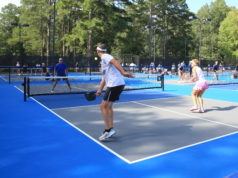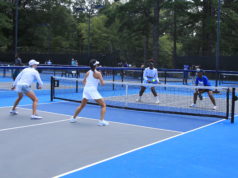BY GREG DUFFY, A RECREATIONAL TENNIS PLAYER
Despite being a business owner and a father, I found myself rediscovering tennis 12 years ago, after a 25-year absence. My wife calls me a tennis junkie now that I play almost every day and take two or three private lessons a week at several of my local clubs. I am a solid 4.0 player, and my goal is to become a consistent 4.5-level player.
As much as I love to compete, I also love taking lessons – a habit with which I’m sure many players are all too familiar. I have experienced the good, the bad and the ugly from the tennis lessons. In my experience, the teaching pros are the heart of any club, so I’d like to share my thoughts on what makes or breaks a good lesson.
The Good
- The teaching pro is on time and prepared with all on-court equipment needed.
- They are energetic and ask me what I would like to do with my time.
- They’re able to manage the time well so I can work on multiple aspects of my game.
- If it’s a hitting lesson, they are ready to rally and move.
- They’re open and social, but keep talk to a minimum, only on a key point to improve my skills.
- I come away with a great cardio workout and possibly a tip to try the next time I play tennis.
The Bad
- The pro arrives late. This happen a lot, more typically when I am traveling.
- When picking up balls, they read texts or emails.
- They excuse themselves to use the bathroom. This can consume 10 minutes of my lesson.
- They are out of shape and have trouble finishing the lesson. This happens a lot when I specifically asked for hitting-based lesson.
- They feed the balls poorly.
- They constantly go back to the basket to get balls because they only put one or two in their pocket at a time.
The Ugly (and The Unbelievable!)
- Pro talks way too much during the entire lesson.
- They are unwilling or unable to rally or move during lesson, even after I expressed interest ahead of time in a point-play-based lesson.
- Once at a well-known tennis resort, the teaching pro, who previously played Division 1 college tennis, was so out of shape he wound up vomiting on the court after 20 minutes of rallying.
Here are my suggestions to help pros keep their long-term clients and reap the financial benefits of satisfied customers:
- Be on time or early to start a lesson.
- Be physically fit or at least indicate when the lesson is being booked that you are unable to hit and move during the lesson.
- Dress presentably.
- Ask for input from the client on what they would like to work on and how they would like to use the time on court.
- Never touch your phone for the hour. Put it away. There is absolutely no place for it.
- Keep water or sports beverages with you.
- Always carry a small notebook.
- Keep talking to a minimum to help give your client a great value.
- Pick one thing your client can improve upon and do not make it too complicated.
- If on the court for hours at a time, try to find time to change or freshen up for your next client.
- Toward the end of the lesson, it is always a great idea for the client to win a drill or practice their strength.
- Pick up all the balls. If your client is helping you, always make sure you are picking up more than them.
I think a good coach can turn into a great one by providing a little extra value when possible. Some simple ways to do this include: sending an encouraging email to each client the same day of their lesson; offering to schedule the next lesson with them to make the client feel wanted and important; and filming a 30-second video of them that examines the stroke they are currently working to improve.
Great coaches also are prepared to market and promote themselves. Many tennis pros think the customers will come to them – even with mediocre service. That might have been true in the past, but certainly not now. As the resident pro, consider dedicating several hours per week to the club owners/managers to teach clinics or free, 30-minute introductory lessons for potential new clients.
I hope some of these ideas will help the pros out there give value to tennis players young and old. Let’s all continue to spread the word about this great game and all the benefits of playing a lifetime sport.




